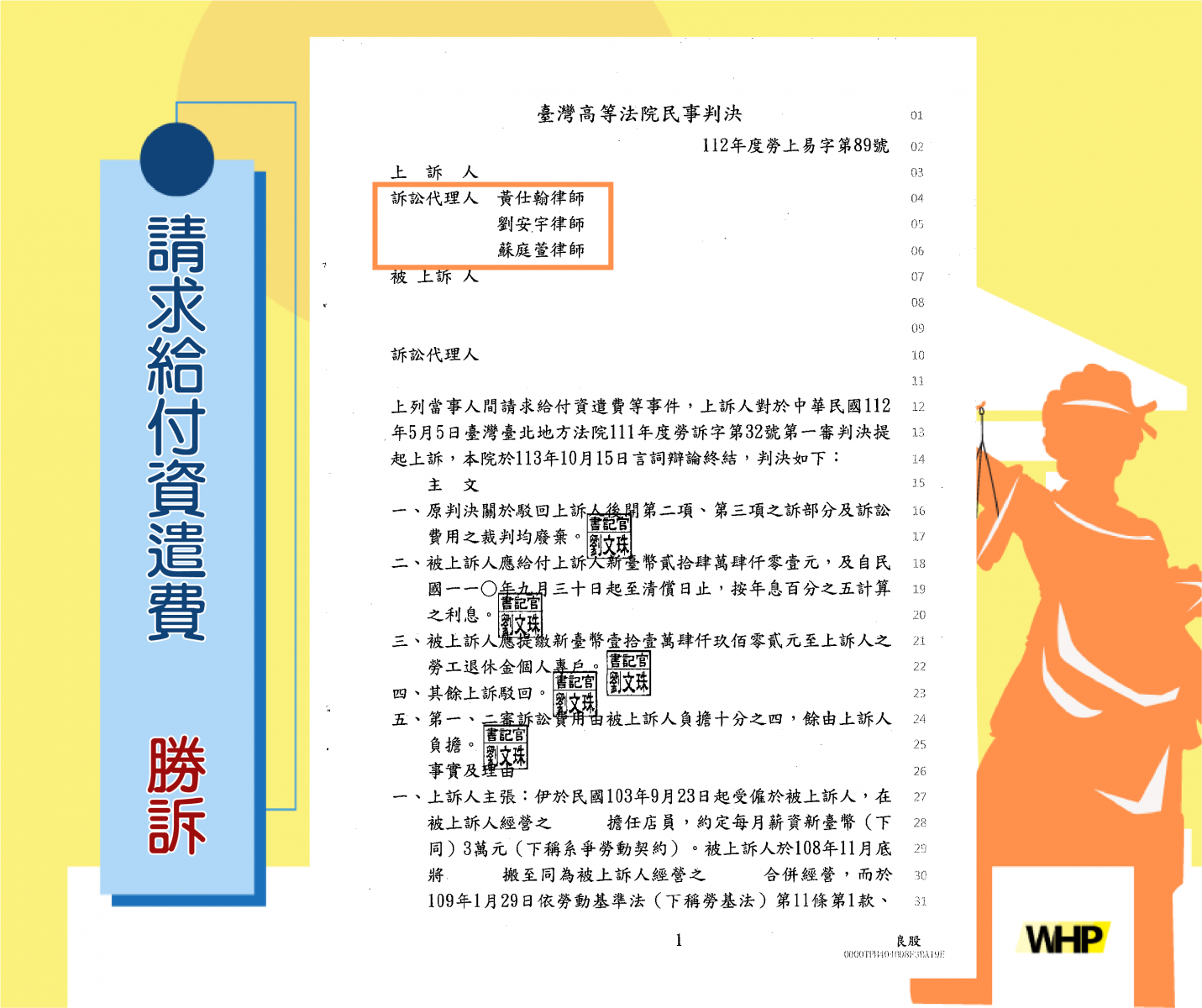首頁 >
| Labor Standards Act | Claim for Related Costs After Being Terminated

Relevant Legal Provisions
An employer may not terminate a labor contract without prior notice unless one of the following conditions applies:
| |
An employer may terminate the contract without prior notice if the worker falls under one of the following situations:
For terminations under points 1, 2, and 4–6 above, the employer must act within 30 days of becoming aware of the situation. | |
If special leave days remain unused at the end of the year or upon termination of the contract, the employer must compensate the worker. If unused leave days are deferred to the next year through mutual agreement and remain unused, the employer must also provide compensation at the next year’s end or upon contract termination. |
Facts and Reasons
The appellant (our client) worked at a certain company for several years but was terminated in 2020. The appellant is now claiming unpaid wages, overtime pay, discrepancies in labor and health insurance contributions, and compensation for unused special leave.
Judgment
Unpaid Wages:
Since the respondent did not contest this claim, based on the labor contract agreement, the appellant is entitled to demand payment of the unpaid wages.Unused Special Leave Compensation:
According to the previous version of Article 38 of the Labor Standards Act regarding special leave, the intention is to ensure workers have opportunities for rest, recreation, and realizing their potential. Workers who have worked continuously for a certain period with the same employer or business unit automatically acquire the right to special leave.
The court requested the respondent to provide relevant evidence but none was submitted. Therefore, under Article 38 of the Labor Standards Act, the appellant is entitled to request compensation for unused special leave.Overtime Pay:
Normal working hours for workers should not exceed 8 hours per day and 40 hours per week. If employers extend working hours, wages for the additional time are calculated as follows:
For up to 2 hours of extended work: an additional one-third or more of the hourly wage.
For further extended hours (up to 2 hours): an additional two-thirds or more of the hourly wage.
The appellant claimed extended work hours during the employment period and provided overtime pay tables as evidence. After deducting break times and subsidies already provided by the company, the appellant is entitled to demand overtime pay from the respondent.Labor and Employment Insurance Contributions:
The respondent argued that the company had fewer than five employees and thus was not obligated to provide labor insurance under Article 6 of the Labor Insurance Act. However, businesses with fewer than five employees, while not required to insure employees, may voluntarily establish insurance units. If such a unit is established, all employees must be covered.
The appellant's claim for labor and employment insurance contributions from the respondent is therefore justified.
Attorneys:Vincent Huang、Hsuan Su
-
03.25 2025
Successful acquittal of lawyer's dummy account def...
-
03.18 2025
Divorce | Claim for Distribution of Remaining Prop...
-
03.11 2025
Criminal Second Instance | Report of Winning a Law...
-
02.25 2025
Civil | Second-instance case of demolition and lan...
-
02.18 2025
Car Accident | Volunteer Traffic Officer Hit by Ca...
-
02.11 2025
Car Accident | Our Lawyer Successfully Assisted th...
-
02.04 2025
Traffic Accident | Lawsuit for Serious Injury Succ...
-
01.21 2025
Fraud | Dummy Account Defendant Successfully Obtai...
-
01.14 2025
Criminal and Civil | Our Lawyer Successfully Helpe...
-
01.07 2025
Obstruction of Sexual Autonomy | Accused of Taking...
-
12.31 2024
Civil Case | Claim for Compensation Adjustment, Vi...
-
12.24 2024
Defamation | Uploading Photos to a Gossip Forum Le...
-
12.17 2024
Civil Case | False Claims in Assignment of Debt: V...
-
12.10 2024
Sexual Harassment | Defendant Not Prosecuted for S...
-
12.03 2024
Breach of Trust | Defendant Successfully Acquitted...